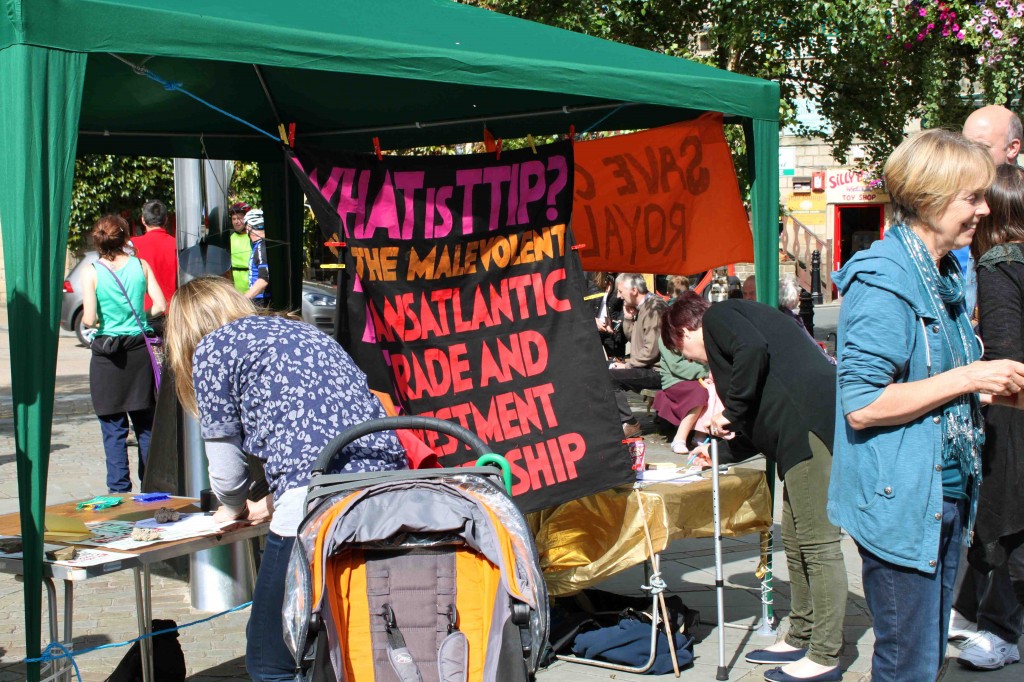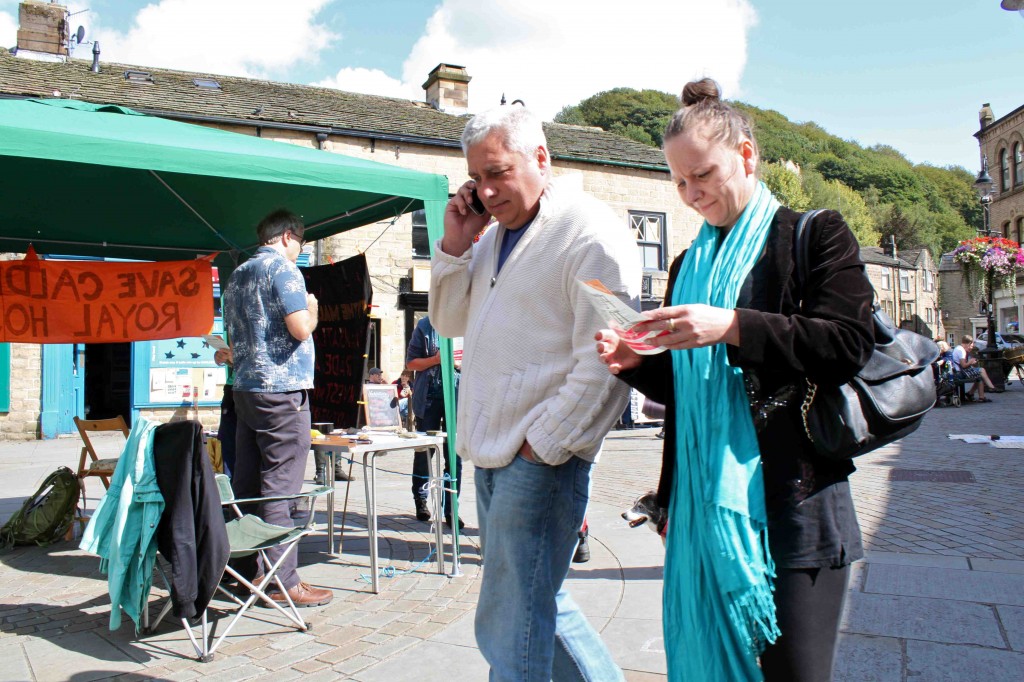By mid afternoon on Saturday 30th August, over a hundred Hebden Bridge residents and visitors had signed the 38 Degrees Petition to Stop the Transatlantic Trade and Investment Partnership (TTIP) Deal at a stall in St George’s Square.
If the government signs up to the Treaty, this will effectively end the NHS, by opening it up to international trade laws that give private health care corporations more power than governments.
The NHS is already being damaged by cuts and privatisation. This process would accelerate, irreversibly, if the government signs up to TTIP.
Hebden Bridge activists were handing out information leaflets to passersby and explaining how the EU-US “free trade” treaty would work, if the UK government signs up to it.
 The Transatlantic Trade and Investment Partnership treaty, currently in rather secretive negotiations between the EU and the USA, would hand unprecedented amounts of power over our public services to global corporations that are accountable only to their shareholders.
The Transatlantic Trade and Investment Partnership treaty, currently in rather secretive negotiations between the EU and the USA, would hand unprecedented amounts of power over our public services to global corporations that are accountable only to their shareholders.
If it goes ahead, it would give corporations the power to sue our government in secret courts, if the government passed any laws that would reduce their profits. This includes things like raising the minimum wage.
It would also allow corporations greater power to sue governments, if governments tried to take back corporate contracts for running public services. This could happen if, for example, the government wanted to close down dirty coal-fired power stations, that have been run by private corporations since our energy industry was privatised in the 1980s.
Or TTIP could also make it impossible for the government to take back a privatised contract if a private company was providing poor public services, which in the age of Atos and Serco is all too common.
It would make it impossible to reverse legislation like the Health and Social Care Act 2012, which is a charter for privatising the NHS.
John H, one of the activists tending the information stall, said,
“The close cooperation of governments and corporations is one of the definitions of fascism. When state and corporations cooperate regardless of the interests of the electorate, it’s incumbent on us to push back. At the moment money rules the roost. I’m here hoping to get enough people raising their voices to stop TTIP going through.”
Rebecca Lyon, with her baby in a buggy, said,
“I signed the petition because it’s really important the NHS stays public – it’s our right to have a public health service, isn’t it?”
There has already been huge pressure to open up the NHS to international trade. Since at least the 1990s, US private healthcare companies have been anxious to tap into rich foreign markets where health services are paid for by large streams of tax revenue and so are virtually risk free.
In the 1990s, secret international negotiations took place on the General Agreement on Trade in Services (GATS). This opened up a long list of public services to investment/takeover by global corporations.
The privatising NHS reforms, carried out by the government of the day, meant that although the government claimed that health services were exempt from the GATS, in fact they were increasingly falling under the rules of international trade law.
As an example of how international trade law affects health services – under a similar treaty to TTIP that already applies in North America, pharmaceutical giant Eli Lilley is seeking $500m in damages against the Canadian government, because Canadian courts ruled that two of the corporation’s drugs patents were invalid. Eli Lilley claims that this means that the Canadian government is non-compliant with the North American Free Trade Treaty. If Eli Lilley wins, it means it has found a way for corporations to override the law in Canada.
Dawn, another of the activists handing out leaflets and talking with members of the public, said,
“I believe that TTIP takes power away from the people and puts it in the hands of corporations that will abuse that power in the name of profit.”
Activists say that asking for exemptions that exclude public services from TTIP won’t work, because all of the country’s public services are already at least part-privatised.
If you missed the stall and would like to sign the petition to stop TTIP, you can do it online here.
Here is a 2013 video with Dr Lucy Reynolds explaining how the drive to “integration” of services, such as the proposed “Right Care Right Time Right Place” NHS shake up in Calderdale and Huddersfield is in fact a push to introduce an American-style private insurance system and how the 2012 Health and Social Care Act was designed to “harmonise” the NHS with the American health care system before the TTIP deal is done.




Does anyone know who could give a talk to a public meeting in Skipton about TTIP in January?
http://rt.com/uk/186772-ttip-nhs-privitization-irreversible/
There is a great article about TTIP in the latest issue of Clean Slate (issue no 93), produced by Center for Alternative Technology. This issue is not yet available on the CAT website. The article is on page 26-27 and is written by Nick Dearden who is Director of the World Development Movement.
Thank you so much for posting this, maybe it will help others to see more clearly what seems like a war from within